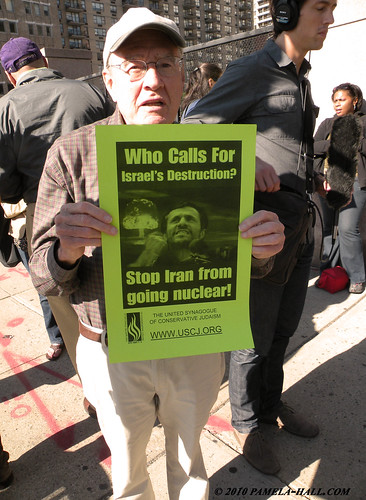
Now, you’ll recall that after the “Flotilla” incident this summer, in which Turkey sent a war convoy to Israel, the name Mohamad Sabbagh came up. Sabbagh is a Bosnian citizen of Syrian origin who has been operating in Bosnia for years, including in affiliation with the Turkish “charity” IHH that organized the convoy. IHH burst onto the scene in 1992 Bosnia to support the separatist regime. It was one of the “humanitarian” organizations “keeping alive the Bosnian jihad and enabling it to succeed against the Serbs,” as retired Indian cabinet secretary B. Raman noted in the Sri Lankan Guardian earlier this summer. Also working through IHH in Bosnia (under the joint auspieces of Britain’s MI6) was Omar Sheikh, who organized journalist Daniel Pearl’s kidnapping.
So sure enough, the Turkish IHH is repeating its anti-Serb model against Israel now. But this goes deeper, with the involvement of Sabbagh being key, which could explain the Bosnian urgency to get him out of Israeli custody after the flotilla arrests. According to the two Defense & Foreign Affairs extracts below, the flotilla incident was a joint Syrian-Turkish war provocation against Israel, hatched in Bosnia — facts that remain unknown to the public, partly because the Balkans is precisely the place where one can operate in the shadows, thanks to public and media disinterest in, and ignorance of, the region. (Little wonder that it was the choice haven for an unknown number of fugitives from the 1993 WTC bombing.)
Did Turkey Declare War on Israel … and the West?
Analysis. By Gregory R. Copley, Editor, Global Information System/Defense & Foreign Affairs. June 7, 2010
…The Turkish Government has increasingly, over the past two decades, taken an active role in facilitating and supporting jihadist groups based out of the former Ottoman Empire territories of Bosnia-Herzegovina and Kosovo (and elsewhere in Serbia, as well as Albania, the Former Yugoslav Republic of Macedonia, and the like). This has not only meant working with Iranian and Saudi elements in financing, and providing logistical support to, terrorist groups aimed at the West, but more importantly — from Ankara’s viewpoint — facilitating the movement and support of jihadist terrorists out of the Balkans (groups such as Kvadrat, which Defense & Foreign Affairs was first to identify) via safe havens in Turkish-occupied Northern Cyprus, to fight the Russians in Chechnya and elsewhere in the Caucasus. This could not have occurred without official Turkish Government involvement, and included the group which organized — again with Turkish Government participation — the “Gaza flotilla” which appeared in late May 2010.
…
Now, finally, the Turkish Government has admitted that it supports and has worked closely with the terrorist support organization, Insani Yardim Vakfi (IHH), which sponsored the Gaza flotilla. IHH has a long history of involvement with the jihadist movement, including those linked to al-Qaida, in the Balkans. This means that Ankara has admitted, finally, that it has been supporting the international jihadist movement against the West, and Russia.
Still, there is always one party at a divorce which observes: “So, you‟ve hated me for years.”
New Evidence Points to Syrian Intelligence Involvement in the “Gaza Flotilla” Incident; Links to Bosnian/Viennese Jihadi Networks Emerging
Analysis.
By Jason Fuchs, UN Correspondent, and Gregory Copley, Editor, GIS/Defense & Foreign
Affairs. June 15
GIS/Defense & Foreign Affairs sources in Croatia confirmed on June 14, 2010, that a key Syrian intelligence officer had been onboard the Turkish ship, the Mavi Marmara, during its attempt to break the Israeli naval blockade of the Gaza Strip on May 31, 2010. The agent, named Jaser Mohamed Sabag, was a Syrian native and naturalized Bosnian citizen.
It is understood that Sabag works directly for the Syrian Military Intelligence Service, Shu’bat al-Mukhabarat al-’Askariyya.
According to GIS/Defense & Foreign Affairs sources, Sabag had worked in the Balkans liaising with regional Iranian intelligence (Vezarat-e Ettela’at va Amniat-e Keshvar: VEVAK) networks to coordinate support for Balkan jihadist networks, including the Turkish IHH (İnsan Hak ve Hürriyetleri ve İnsani Yardım Vakfı), which purchased the Marmara for $800,000 in April 2010 and — ostensibly — spearheaded the so-called Gaza flotilla.
This had, as outlined in the Defense & Foreign Affairs report of June 7, 2010, confirmed the Turkish Government’s linkage to the terrorist support work of IHH in the Balkans, during which time the jihadist terrorist groups there, using the IHH links, had been used against Western targets. But more importantly, it highlighted the links between the Turkish Government — via the Turkish National Intelligence Organization (Milli İstihbarat Teşkilatı: MİT) — with the Syrian Mukhabarat for many years in jihadist support operations, pre-dating the break-up in Turkish-Israeli relations. [FOOTNOTE: As well, (MIT) was clearly linked to the Bosnian terrorist/jihadist movement through the Kvadrat movement, which operated terrorist training in Bosnia, moving its operatives into the Russian Caucasus, to Chechnya, via safe-havens in Northern Cyprus, controlled by the Turkish Armed Forces, and then into the Russian Federation via Turkey…]
The presence of Sabag onboard the Marmara raised a number of questions about the true nature of how the flotilla had been organized, funded and directed. It indicated, at a minimum, Syrian Government involvement, and, at most, that unwittingly many of the flotilla’s passengers had been used as cover in the intelligence gambit by Damascus and Ankara.
By the first week of June 2010, Sabag had already been deported by Israeli authorities to Turkey and GIS/Defense & Foreign Affairs sources reported that by June 12, 2010, Sabag had left Turkey and returned to Sarajevo, along with Mukadera Tankok-Tanovic, a Turkish national and IHH “coordinator”. The daily newspaper Fokus, published in Banja Luka, Republica Srpska, Bosnia & Herzegovina, further reported that before working with jihadist networks in the Balkans, Sabag had been in charge of “intelligence affairs” for the Abu Nidal Organization (ANO) where he established an effective working relationship with Halil Badia, the daughter of Abu Nidal (born Sabri Khalil al-Banna). Halil Badia, the report continues, assumed control of the ANO following her father’s death in Baghdad on August 16, 2002, and has since become “a main financier of the Wahabbist [sic] movement in B-H (Bosnia & Herzegovina)”.
GIS/Defense & Foreign Affairs sources confirmed that while Badia had been unable to access her late father’s Swiss bank accounts — which had been blocked several years ago as part of Western counterterrorism efforts — she and her family “managed to withdraw a substantial part of the money from Austrian banks”. It was believed that a significant portion of this money had been redirected to Balkan-based networks.
That the money had flowed through Austria was not merely a coincidence: the Viennese Islamist community had, for some time, played a central support role in organizing jihadist activities in Bosnia.
…
The still emerging evidence of connections between Syrian intelligence operations in the Balkans, Bosnian jihadists, and the voyage of the Marmara raised serious questions for the West and particularly for NATO of which Turkey is a member about the extent to which the Turkish Erdogan Administration had been aware of these linkages when it gave permission for the Gaza flotilla to set sail. If, in fact, Prime Minister Reçep Tayyip Erdogan had known about the presence on the Marmara of a Syrian intelligence agent with deep, long-standing ties to the global jihad movement, further questions would be raised about the extent to which Istanbul has chosen to reorient its strategic posture.
However, there can be no doubt that the long-standing relationships between MIT, IHH, and the Shu’bat al-Mukhabarat al-’Askariyya — along with the relationships which all three have had with the various Saudi and Iranian organizations in the Balkans — facilitated, or at least led to, the Marmara provocation.
And so, in very recent news we see the shifting and/or tightening of Israel’s alliances in the Balkans. While Benjamin Netanyahu was visiting Greece a couple weeks ago to discuss matters of the two countries’ military alliances, these were some of the other Israel-Balkans headlines:
“Israel understands Serbs in Bosnia”
17 August 2010 | Source: Tanjug
BANJA LUKA — Republic of Srpska (RS) Prime Minister Milorad Dodik stated that Israeli President Shimon Peres understands the position of the Serbs in Bosnia-Herzegovina.
Dodik, who is on a visit to Israel, said that the Israeli president had said that the wish and aspirations of the peoples in Bosnia-Herzegovina have to be respected and that stability and peace have to be preserved.
Dodik also said that he discussed the situation in the Balkans, and that he was informed about the situation Israel is being faced with in its efforts to preserve stability and its state identity.
“This was an opportunity for me to underscore that it is evident that the international community and its high representative had carried out political and legal violence in the RS and that it had altered the Dayton Agreement,” said Dodik.
Dodik reiterated that he and President Peres had a lot in common on all issues, particularly those relating to Turkey’s growing engagement in the Balkans, noting that Turkey is being engaged on the side of a the Bosniak people alone.
Bosnia “Increasingly Can’t Survive”
…Dodik said that his recent visit to Israel, where he met with the country’s top officials, was one of the most important trips he has had lately, in view of the fact that Jerusalem conducted a “balanced policy in the complex conditions of the Middle East relations”.
…
He also noted that Bosnia-Herzegovina on several occasions voted in favor of UN Security Council resolution that “put Israel in a complex position”, and that this came as a result of activities by Muslim and Croat members of the Bosnian presidency Haris Sijaldžić and Željko Komšić, and FM Sven Alkalaj [a Jewish Bosnian].
Dodik once again accused Turkey of meddling in Bosnian affairs, and to support only the Muslim (Bosniak) side.
Dodik Condemns Turkey’s Activities In Bosnia (AFP, Aug 16, 2010)
…“We resent the fact that Turkey wants a unified and centralized Bosnia, favoring only one of the peoples” living in the country, Dodik told Bosnian state radio from Israel, following talks with Israeli Foreign Minister Avigdor Lieberman.
Dodik said he had told Lieberman that the Bosnian Serb community “resented Turkey’s strong presence in Bosnia motivated only by support for the Bosnian Muslims, without any willingness to comprehend the context in which Bosnia exists.”
“I told the minister that it is not possible to accept an intermediary role by Turkey,” he said, without elaborating.
…
Bosnian Serb leaders have constantly opposed further centralization, as demanded by the Muslims–who are a majority in Bosnia as a whole and seek to dominate. Serbs say such a process would reduce their autonomy. […]
Israel supportive of Bosnian Serbs
Aug 17, 2010
Bosnian Serb Prime Minister, Milorad Dodik, said that Israel has expressed its full support and understanding of the Bosnian Serb Republic and its efforts to fully implement the Dayton Peace Accords that are to govern Bosnia.
“We feel that Turkey desires to create a unitary and centralized Bosnia for one ethnic group only. We cannot accept such role of Turkey in Bosnia, especially because of its biased position,” said Dodik.
Dodik, on the right, in a meeting with the Israeli delegation.
…Dodik said that he explained to Israel that recent Bosnian anti-Israeli votes in the UN do not reflect the opinion of Bosnian Serbs whose foreign policy is constrained and dominated by Bosnian Muslims.
“How is it possible for Bosnia to vote against the interests of Serbs, first of all, when we are not seeking to vote for anything that would impede on the Israel’s security,” said Dodik.
Bosnia consists of three “constitutive” ethnic communities but Bosnian Muslims desire to dominate them. Dodik invited Israeli investors to come to the Serb Republic.
“We told them to invest in Serb Republic, despite the crisis that dominates in all countries,” Dodik said.
The Prime Minister specified that Israel expressed its greatest understanding on the dangers of terrorism in Bosnia.
Earlier this year, Israel warned that Islamic terrorists are actively recruiting Bosnian Muslims and ethnic Albanians in the Balkans for terror. Israel also warned that the Balkans is the next area that Islamic terrorists have set their sights to.
Days ago, authorities in the Serb Republic [arrested] 5 Islamic extremists of whom one was an ethnic Albanian. The arrested men had weapons and machetes used for Islamic ritual of beheading.
Dodik said that a visit by the Israeli delegation to the Serb Republic is possible because both sides have expressed desire to expand economic activities.
Dodik said that the Serb Republic and Israel will continue to cooperate and keep in contact on various diplomatic levels.
Republika Srpska Premier Dodik Discusses Position of Serbs in Bosnia with Israeli President Peres
…Dodik reported that the Israeli president had declared Bosnia-Herzegovina must respect the will and desires of the people and preserve stability and peace.
…
Dodik pointed out that he and Israeli president Peres saw eye to eye on many issues, especially in connection with Turkey’s engagement in the Balkans, which is evidently growing…
“We agreed that Turkey had likely drawn up an action plan in order to allegedly preserve Bosnia-Herzegovina’s territorial integrity, but actually promoting the principle of Bosnia-Herzegovina’s centralized government, which Turkey believes should be strengthening and creating a unitary state in this region,” Dodik said.
…
“This was a good opportunity for me to explain that the Serb side was not behind [the UN vote against Israel]. It transpired once again that Bosnia-Herzegovina is not well coordinated, in view of the fact that voting in the UN is conducted without an agreed procedure and coordination of policy…”
Related: Cyprus says will not allow Gaza-bound aid ship (Aug. 20, 2010)
NICOSIA (Reuters) – Cyprus will not allow a ship carrying women activists and aid for the blockaded Palestinian territory of Gaza to sail from its ports, the island’s police said on Friday.
Women activists said they planned to take aid to Gaza next week and their vessel, the Mariam, would set sail from Lebanon for Cyprus on Sunday.
…
“Our position is clear. The arrival and departure of vessels to or from Gaza via Cyprus ports is prohibited and we will implement that decision,” Cypriot police spokesman Michalis Katsounotos told Reuters.
In New York, Israel’s U.N. Ambassador Gabriela Shalev sent a letter to Secretary-General Ban Ki-moon and her Russian counterpart Ambassador Vitaly Churkin, president of the Security Council this month, complaining about the aid ship and the reported approval of its departure by Lebanon.
Shalev said the organizers were “individuals with suspected ties to the Hezbollah terrorist organization” who intended to break through the blockade of the Gaza Strip.
…
“Such confrontational actions by the organizers of these vessels, as well as those that offer their consent, is deeply troubling and requires the attention of the international community,” Shalev added.
Cyprus was used as a launch pad for activists to reach Gaza by sea from 2008 until mid-2009. Authorities introduced a ban last year, citing the island’s national interests.
To close up this post about the resurgent Ottomans in the Balkans, we have a revealing 2006 text from author Srdja Trifkovic, demonstrating that before our eyes is unfolding the fruition of a plan long in the making:
…A decade ago an Orientalist who was at that time Yugoslavia’s ambassador in Ankara, Darko Tanaskovic, came across an interesting little brochure in a second-hand book shop in Istanbul. It was a very old propaganda pamphlet issued by an Albanian émigré organization, and it contained a simplified colored map of the Balkans. The map showed a green arrow emanating from Turkey, thrusting through the Muslim-populated parts of the Balkans (Thrace, Macedonia, Kosovo, Sanjak, Bosnia), severing the links of the unbelievers’ defensive steel chain, and victoriously heading to the north-west, towards the heartland of Europe. This geopolitical idea, known for decades as the Green Route (“Zelena transverzala”) both by the advocates and opponents of Islamic inroads into Europe, was simple but very suggestive…
As Yugoslavia started disintegrating in the early 1990s, most Western analysts of world affairs promptly categorized the Green Route thesis as a crude, anti-Muslim conspiracy theory, mainly propagated by nationalist Serbian academics. Then along came Huntington’s Clash of Civilisations and his subsequent book of the same name. The supporters of the Green Route thesis welcomed Huntington’s work because he used the war in Bosnia-Herzegovina (1992-95) as a key illustration of the Christian-Muslim “fault-line wars.” The proponents of a pro-Bosnian Muslim, pro-Kosovo Albanian policy in Washington, by contrast, insisted that helping Muslims in the Balkans was the best way of courting favor for the United States in the Islamic world.
The Green Route theory has gained fresh credence, in Europe at least, after 9-11. It is by now hard to dispute that the radicalisation of Islam in the Balkans — deliberate or not — turned out to be the net result of the actions of the “international community” during the Yugoslav crisis. In fact, “If Western policy in the Balkans was not meant to facilitate the Green Route, the issue is not why but how its effects paradoxically coincided with the enduring aspirations and goals of pan-Islamism, including its extremist and even terrorist manifestations.”
After 9-11, nothing was supposed to be as before, but the U.S. policy in the Balkans has inexplicably retained its Islamophile bias, so remarkably persistent during the Clinton years. In the meantime, the Green Route has morphed from an allegedly paranoid Islamophobic propaganda ploy into a demographic, social and political reality…



















